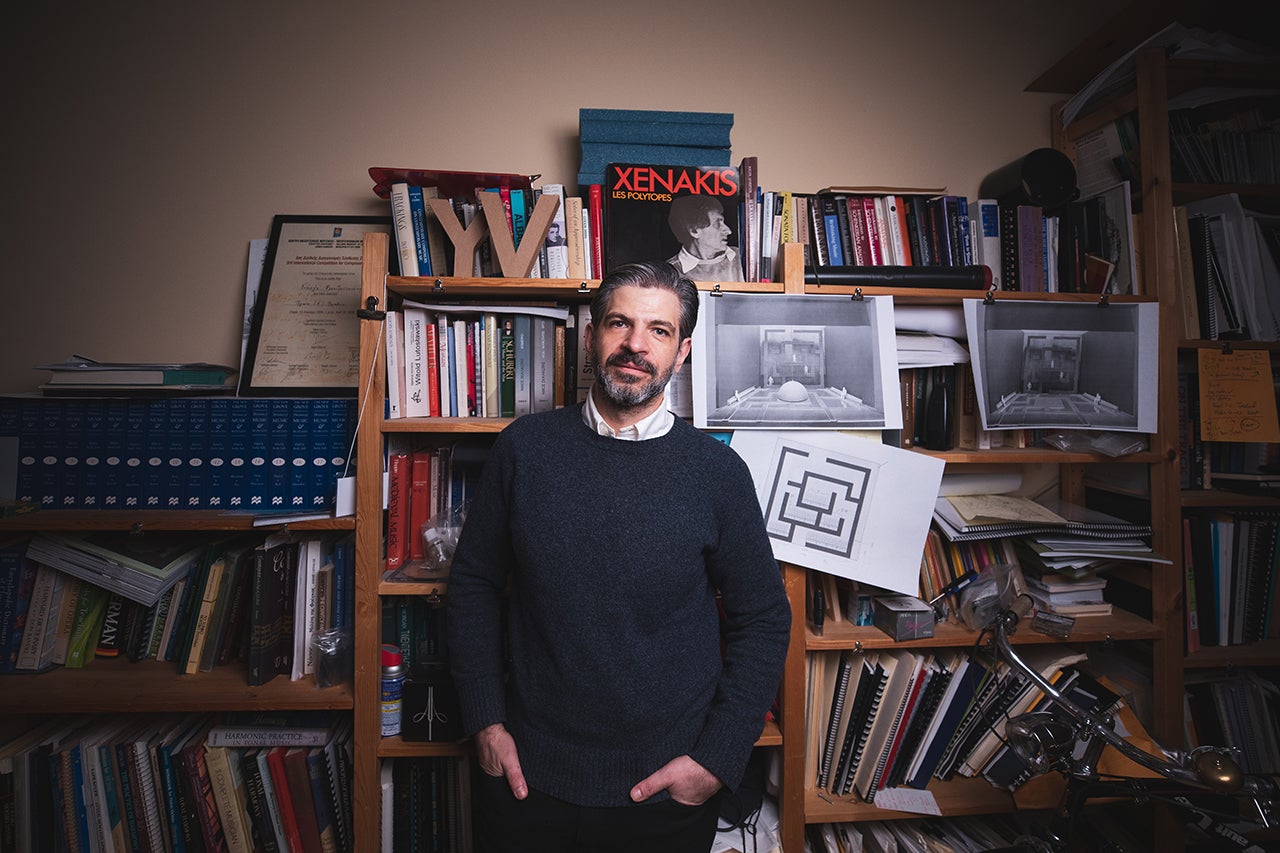Above: Yiorgos Vassilandonakis, associate professor of music theory and composition.
COVID-19 may have forced a decisive interlude in live music in 2020, but Yiorgos Vassilandonakis still managed to score big both on the international stage and within the College of Charleston music community.
That’s because, in 2020, the associate professor of music theory and composition scored the music for a short film called Hamam, which took off in the international independent film festival scene, becoming an official selection at the Seoul International Indie Film Festival, the Roma Short Film Festival and a featured film in the Tokyo Film Festival.
And he recorded it all with College of Charleston musicians, providing music majors Eric Pickford (violin) and Maria Savelyeva (cello), artist certificate graduate Savannah Grace Cash (viola), adjunct faculty member Philip Lipton (clarinet) and music composition alumnus Matt Tuton ’15 (audio engineer and producer) the opportunity not just to showcase their talents on an international scale, but to have their names in the credits of a film.
“Since I’m in the middle of this rich music community, I tailored the score to what I had available in terms of talent within the community,” says Vassilandonakis, adding that he prefers to work with live musicians. “It’s only natural to work with musicians who are close to you physically and geographically, as well as people you know how to work with. I also thought it would be a great opportunity and experience for them. None of them had done this before, and the high pressure of recording in a studio is good experience to have.”
Pickford certainly agrees.
“This opportunity was one of my first times recording in a studio setting, regardless of the fact it was for a film,” says the senior. “Although I have studied classical music since I was 7 years old, this was my first film score and my first ‘real’ recording for professional purposes. Additionally, at the time, I had very little experience premiering new compositions, so this was also unusual in that this was the first time this music had ever been played.”
RELATED: Find out more about Vassilandonakis and the music he composes.
And, of course, that provided a challenge in and of itself – especially since the musicians hadn’t even seen the score before they met to record it in Tuton’s Johns Island recording studio.
“It was such a last-minute thing. I finished the score on Saturday and had to record it the next morning to submit it by Sunday night for release in order for the film to make a festival submission deadline – so it all had to happen very quickly and efficiently. There was no room for error,” says Vassilandonakis, adding that – because there’s rarely much of a post-production budget for films, recording time is often rushed. “It’s typical for films to be scored at the very last minute with no budget. That’s just how the industry works.”
“Studio recordings are challenging in that time is limited – and for any musician this issue is complicated by the fact that we always want our recordings to be perfect. In some cases, as was for us, our recording time also included our only rehearsal, so that we had to learn, rehearse and record the composition all in one session,” says Pickford. “We were able to meet these goals, however, and I was able to learn an extraordinary amount about recording during the process.”
 And it all paid off with the success of Hamam, which Soul Productions describes as the story of a painting and its owners, their families, desires and destinies throughout the history of modern Greece.
And it all paid off with the success of Hamam, which Soul Productions describes as the story of a painting and its owners, their families, desires and destinies throughout the history of modern Greece.
“The inspiration for any film score is the film itself. The music is the voice of the visual narrative, so it needs to be built from within and work seamlessly and unobtrusively with the images,” says Vassilandonakis, who studied film music with the legendary Jerry Goldsmith, Paul Chihara and Don Ray. “In this case, the movie tells a story through the point of view of a painting, so the music becomes the voice of the painting, shaped little by little with each scene and interacting and conversing with the movie’s human characters. It has intimate chamber music – and like nature, it needs to be transparent and present at the same time.”
Even though Vassilandonakis has extensive experience and advanced degrees in composition and scored several films in the ’90s, he says scoring and recording the music for Hamam was a learning experience for him, too.
“It was a great experience for all of us. I plan on getting back to doing professional film projects like this one with students and local musicians,” he says. “It’s high-pressure work, but having that experience and getting credit on a film: Every one of us wins.”





